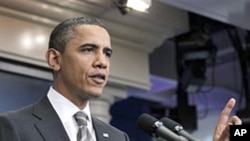President Barack Obama's decision to strike a compromise with opposition Republicans on a tax cut plan has set off a mini-rebellion among many congressional Democrats who say the president is not fighting hard enough for core Democratic principles. Political analysts say Mr. Obama's move to the political center has a lot to do with his own re-election hopes in 2012.
During his time in office, President Obama has relied on Democratic support to pass his agenda in Congress. He has had little success in winning Republican votes, in part because Republicans often opposed his policies on principle.
So the president's decision to broker a compromise with Republicans to extend tax cuts first approved during the Bush administration in exchange for continuing unemployment benefits for millions of Americans out of work appears to mark a pivot point in his presidency.
"And that means because it is a big, diverse country and people have a lot of complicated positions, it means that in order to get stuff done we are going to compromise," said President Obama.
The compromise comes just weeks after Republicans made huge gains in Congress in the midterm elections in what amounted to a public referendum on the president's tenure in office.
But many congressional Democrats are angered by the tax cut deal and accuse the president of not fighting hard enough against extending the Bush tax cuts to the very wealthy.
New York Representative Anthony Weiner spoke on ABC's Good Morning America:
"We want the president to be a success," said Weiner. "There is no doubt about that and that is what separates us from the Republicans. But I have to tell you something. It is only going to get worse for the president if he allows himself to be pushed around with deals like this."
On Thursday, a majority of House Democrats signaled they are against the plan in a voice vote at a closed caucus meeting, at least temporarily stalling the White House push for a quick vote in Congress.
Mr. Obama's decision to strike a deal with Republicans sent political shockwaves to the liberal wing of the Democratic Party, says Faiz Shakir of the Center for American Progress, a guest on VOA's Encounter program.
"And so it was shocking and distressing, I think, to the Democratic base to see President Obama basically acquiesce on one of his key domestic policy platforms and get really nothing in return of value in my view," said Shakir.
At a news conference earlier in the week, President Obama defended the compromise with Republicans and also had a message for Democrats who fear he has lost the taste for partisan battle.
"I will be happy to see the Republicans test whether or not I am itching for a fight on a whole range of issues," said Obama. "I suspect they will find I am and I think the American people will be on my side in a whole bunch of these fights."
Some conservative Republicans have criticized the tax cut deal as well because they fear it will add to the growing budget deficit. But Senate Republican leader Mitch McConnell of Kentucky says most members of his party support it.
"We've reached a bipartisan agreement," said McConnell. "It is time Democrats in Congress reach a similar conclusion and enable us to act for the good of the whole country."
Many political analysts suspect the president is trying to regain the support of independent voters with the compromise over tax cuts. Independent or centrist voters were a major part of President Obama's victory coalition in 2008, but many of them abandoned the Democrats this year and voted Republican.
Numerous surveys show independent voters also want the two parties to work together instead of engaging in endless partisan warfare.
Democratic political strategist Mark Penn advised former President Bill Clinton in the mid-1990's when he found areas of common ground with Republicans.
"The president, I think, in moving to the center, has got to be able to say to the left and the right that look, the voters want to see some accomplishments here and that if we fail to bring accomplishments, no one is going to be the winner here," said Penn.
Analyst John Fortier of the American Enterprise Institute says the president may be taking a page from the political playbook of Mr. Clinton, who often found a way to position himself in the political center in his battles with Republicans in the 1990's.
"You might call it, if you went back to the Clinton era, a kind of triangulating where the president is now floating somewhere between the Republican Party and his congressional Democrats, and it is a difficult strategy to pull off but if he can do it, it is a smart one," said Fortier.
Bill Clinton's strategy of triangulation helped him win re-election in 1996, and many political experts believe President Obama may be looking to repeat that strategy as he looks ahead to his own re-election battle in 2012.
Obama Tax Deal Angers Democrats
- By Jim Malone





